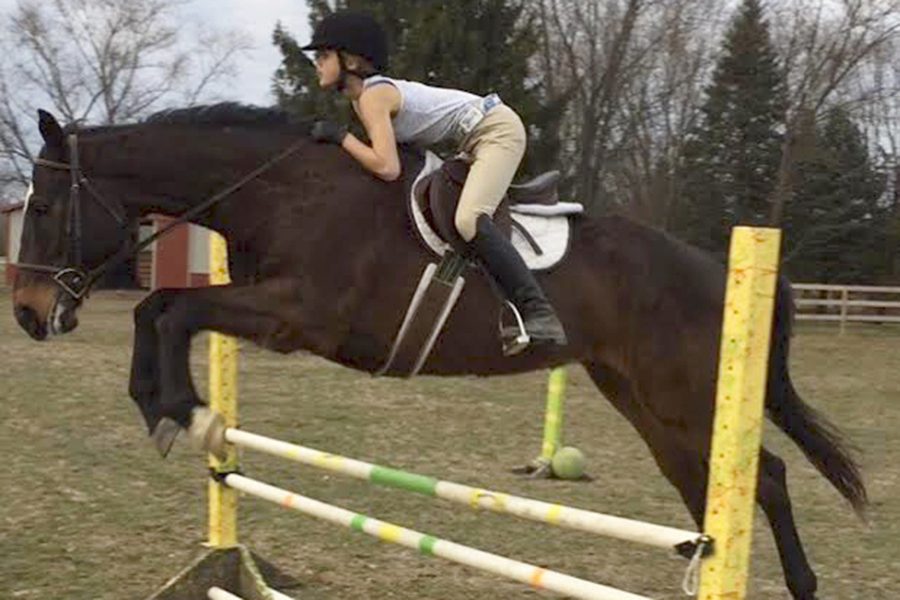Freshman qualifies for riding competition
Zones Competition takes place on March 25-26 says Diane Houk
Freshman Diane Houk jumps her horse in preparation for her upcoming competitions. She owns two of her own horses, named Zorro and Double.
Freshman Diane Houk has been surrounded by horses her entire life, so it is not surprising that she took up the sport of horseback riding.
“I started because my mom was teaching other kids how to (ride horses) so I kind of just grew up in that environment,” Houk said.
After learning how to manage herself on a horse, Houk was ready to compete by the time she was around five years old. Houk owns two horse to help her practice. “One is named Zorro and the other is Double,” she said.
However, when Houk competes she has to follow a rule that makes the sport more difficult; she cannot ride her own horses in competitions.
A typical competition
Houk describes a typical competition: “You go to the facility, you draw a horse’s name out of a hat, and then you get on and you are expected to ride the horse professionally and make it look nice.”
Going in blind to the horse helps showcase the skill of the rider.
“All horses are different, so it kind of depends on your knowledge of how to handle horses like that. Most of the horses are really nice though,” Houk said.
After the rider chooses his or her horse, the competition begins. Houk said, “There’s different classes in competition, and I am in a flat class and an over fences class, which is jumping. Then there’s the flat class where you work on what is called equatation, which some people describe as looking pretty on a horse, but mostly it’s proper riding– demonstrating balance and skills.”
Earning her way to Zones
Houk competes through the Interscholastic Equestrian Association (IEA) and has qualified for the Zones Competition, which takes place on March 25-26. Houk said, “This is my first year doing IEA, so I’m really excited to have made it that far.”
“Thanks to my family and trainers and teammates for helping me get here” Houk said.
Houk’s coach on the Central Indiana Equestrian Team, Mrs. Emily Farmer, said, “Diane has earned her way to Zones by her daily dedication and hard work. She asks questions and tries her heart out on everything that is asked of her during practice.”
Like Houk, Farmer grew up in the environment of horseback riding. “I’ve competed my entire life. Both of my parents and grandparents were professionals as well,” she said.
Farmer’s love of the sport drove her to pursue a career in that field.
Farmer said, “I’ve been coaching for IEA for 2 years. I’ve been a United States Equestrian Federation senior professional trainer since 2007. I trained on my family farm since I was 18, so I’ve had 17 years experience training.”
Through all the years that Farmer has been engaged in horseback riding, she says that not much has changed. “They like to keep things traditional. All the attire is still the same classic look: tall black boots, tan breeches, collared shirt and navy or black show coat,” Farmer said.
Innovations have come in order to provide safety and comfort, however. Farmer said, “They have made new rules for safety, as in having to wear a certified helmet in competitions. Saddles have gotten a lot more comfortable with more padding, and the boots are easier to put on because they have added zippers. In the good old days, we had to pull them on with boot pulls and get assistance in taking them off.”
Even with these changes, the backbone of the sport has stayed the same: the rider must control the horse throughout the competition.
It is this aspect of horseback riding that has attracted Houk and many others. She said. “I love the venue; I love being around everything that’s there: the people, the horses, basically the horse show culture. It’s a unique feeling and it’s really cool.”







